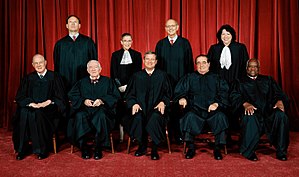In a long-awaited decision, the court's emboldened conservative majority declared that the limits on so-called "independent expenditures" by corporations violate First Amendment free-speech rights. The much-anticipated decision means that more money can be spent on federal elections, including this year's congressional elections.
"The government may regulate corporate political speech through disclaimer and disclosure requirements, but it may not suppress that speech altogether," Justice Anthony Kennedy wrote for the five-member majority.
However, Justice John Paul Stevens, writing for the four-member minority, warned that the ruling would harm the political system as well as the court's reputation. In striking down certain corporate campaign-spending limits, the court reversed its own earlier decision.
"The court's ruling threatens to undermine the integrity of elected institutions across the nation," Stevens wrote.
The "independent expenditures" covered in the case called Citizens United v. Federal Election Commission are different from the campaign contributions that union and corporation political action committees make directly to candidates.
Instead, the mostly closely watched political-speech case of recent years covers the money that corporations and unions spend from their own treasuries on ads and other advocacy efforts.
The court's decision Thursday rolls back a key provision of the 2003 Bipartisan Campaign Reform Act, commonly known as the McCain-Feingold law. In doing so, justices took the relatively unusual step of explicitly overturning the court's own precedent.
The PACs also can spend money independently, funding ads and the like. Under Section 203 of the McCain-Feingold law, however, unions and corporations couldn't directly finance from their own treasuries "electioneering" communications within 30 days of primaries and 60 days of general elections. These are messages that explicitly urge a vote one way or another, or that are reasonably interpreted as having done so.
The 1990 case Austin v. Michigan Chamber of Commerce had upheld a state law that banned corporations from making independent expenditures using corporate funds to support or oppose candidates. The court's decision Thursday overturned the 1990 Austin ruling.
source-miamiherald.com

![Reblog this post [with Zemanta]](http://img.zemanta.com/reblog_e.png?x-id=fbf9654a-d210-466e-9700-ac8bf85f81e2)
0 Responses to Supreme Court ends limits on corporate campaign spending